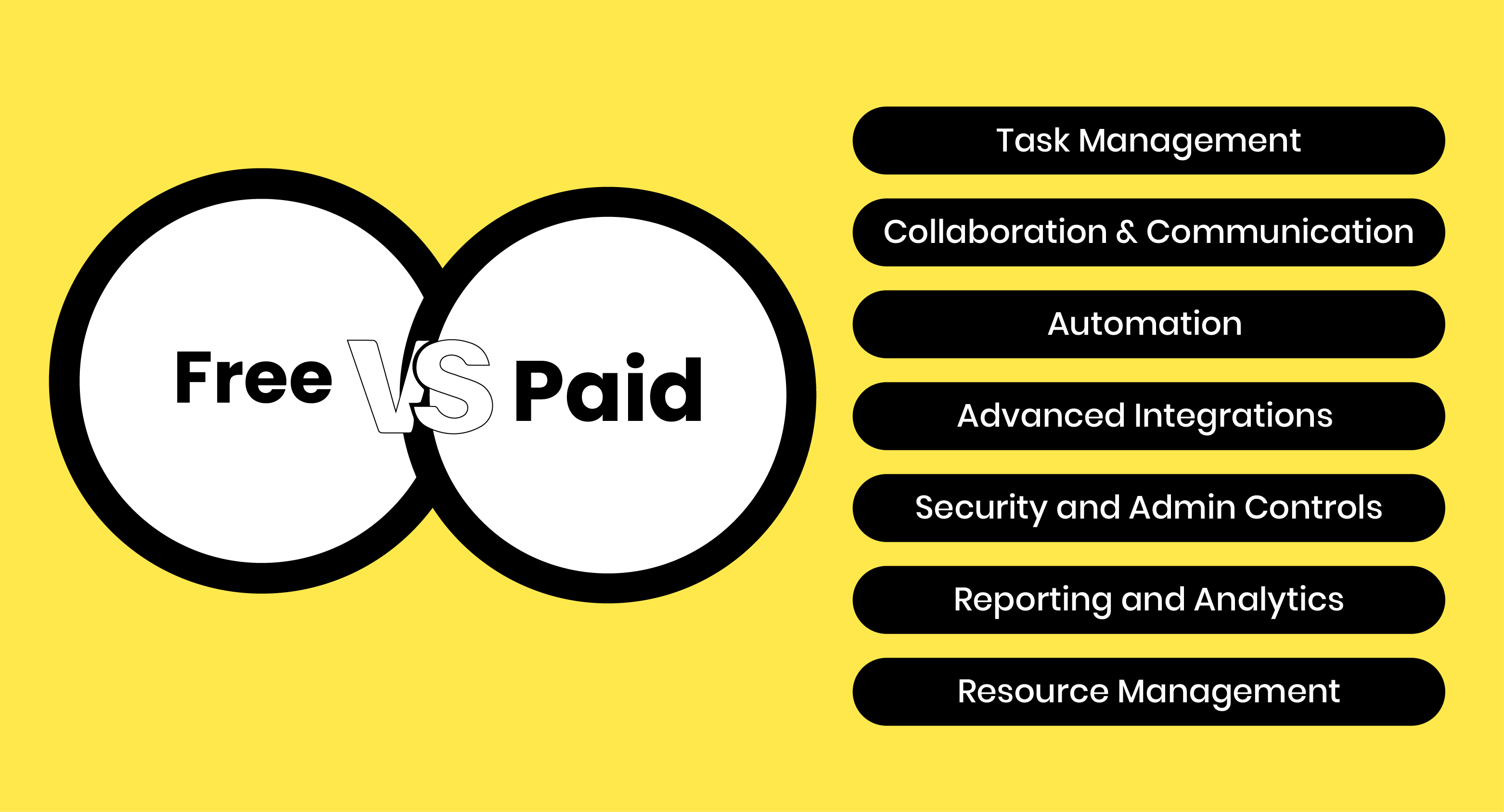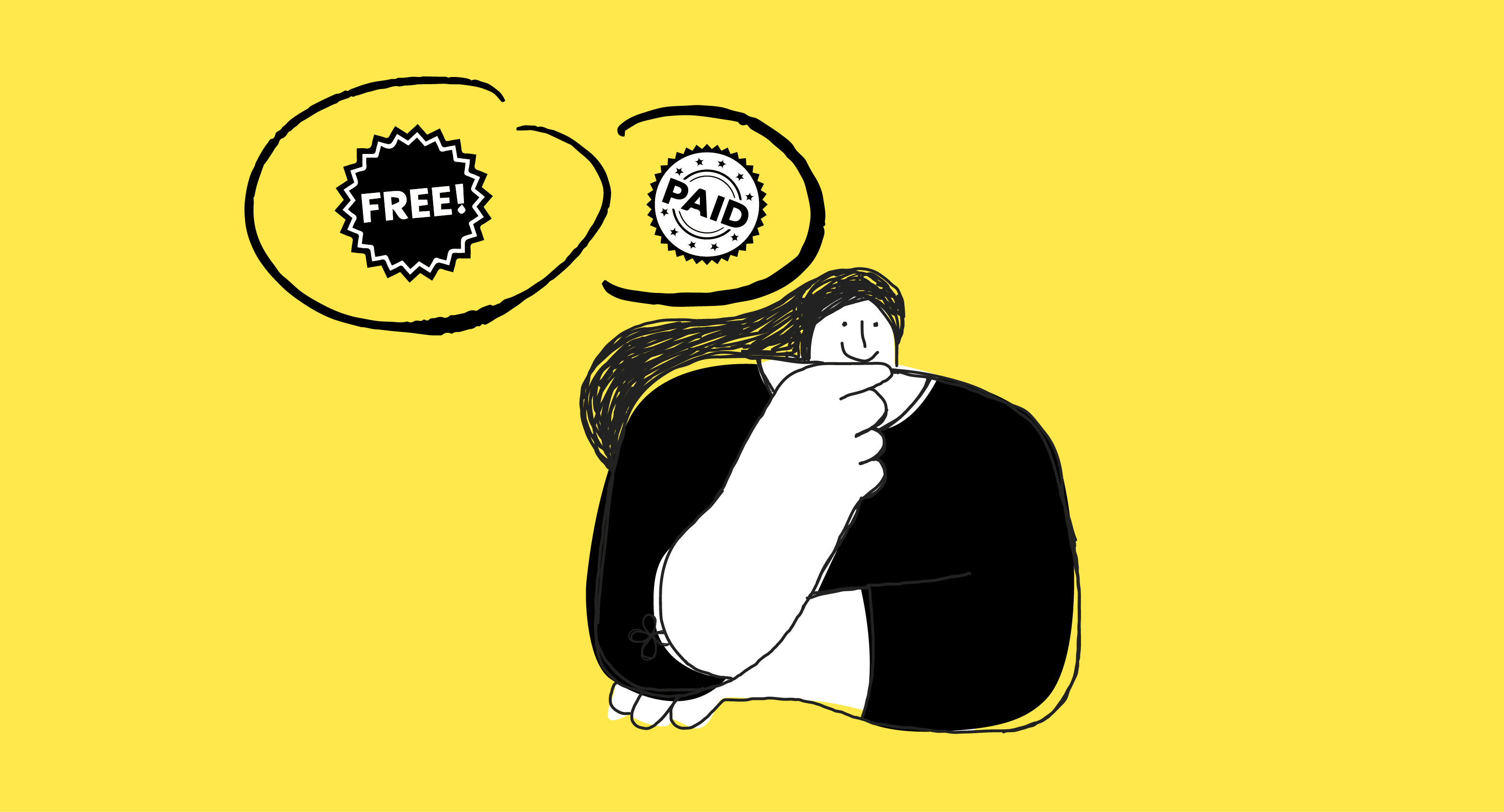For many growing agencies and startups, the common debate is between paid vs free project management tools. Free tools look attractive as they are offered at no cost, while paid tools justify their worth by providing advanced features. This constant debate over paid vs free pm tools leaves teams wondering which option is truly the better fit.
However, the main issue that often confuses users is the idea that using features without paying must be the better option. On the contrary, some argue that even though we spend money on expensive software, we get a smoother tool. So, which one is better for your needs will be explored in this blog.
Features Comparison: Paid Vs Free Project Management Tools
The main difference between free and paid project management tools is in their features. Here’s a quick comparison of both.

Task Management
Task Management is the core feature of any project management tool. It ensures everyone knows what they’re responsible for and when it needs to be done.
Paid PM tools offer more access than the free tools, such as creating more complex task assignments. For example, in software development teams, Jira’s paid plan adds features like story points, epics, and sprints.
Signing up for a free plan will give you basic task creation. For instance, a free tool like Trello is a great example of basic task management. Because you can create tasks, assign due dates, and add checklists.
Collaboration & Communication
This feature allows teams to discuss tasks right where the work is happening. Instead of relying only on emails, these tools provide features like comments, chat, file sharing, and notifications.
The paid version provides access to collaboration tools, including integrations with Slack, Teams, and Google Drive. E.g., ClickUp’s paid plans provide an all-in-one workspace with chat, comments, mentions, and screen recordings.
In the paid version, you get additional features, but the user limit is still quite low. Some free tools, like Trello's free plan allow up to 10 collaborators with 10 boards, unlimited cards, 10 MB file uploads, plus comments and basic notifications.
Automation
Automations in a project management tool allow tasks and actions to be handled automatically based on set rules, saving time and making workflow automation easier for teams.
Monday.com is the ultimate project management tool, with paid plans offering around 250 automations per month and enterprise plans giving even more.
Free project management tools usually offer very limited automations each month. For example, Monday.com’s free plan doesn’t include any automation at all; it’s only available in their paid plans. ClickUp, on the other hand, is more generous. Its free plan gives you task management with unlimited users, built-in automations like assigning tasks or sending reminders, and integrations with tools such as Slack and Google Drive.
Advanced Integrations
Advanced Integrations in a project management tool enable seamless connections with other apps, allowing information to move smoothly between them.
Paid plans offer a significantly larger number of automation actions. For example, ClickUp’s Business plan and higher include unlimited integrations and thousands of automation actions.
In the free version, you either get no access to integrations or only a limited number of actions per month. For example, Freedcamp’s free plan lets you connect with Google Calendar, Dropbox, OneDrive, Gmail/Outlook, and Zapier.
Security and Admin Controls
This feature keeps project information safe using security measures. It also enables admins to control task visibility and editing, as well as manage team members by assigning them roles.
Paid plans let you control who can view, edit, or manage projects. They also include Single Sign-On (SSO). The best example is Zoho’s paid plans that offer role-based access, two-factor authentication, and compliance with standards like GDPR.
Free plans only give security with email and password. You can invite or remove team members. Wrike’s free plan lets you track tasks, use email integration, and get 2 GB of storage, but it doesn’t include advanced security features like dashboards.
Reporting and Analytics
Reporting & Analytics show how projects and tasks are going. It gathers data, such as completed tasks and team workload, and then turns it into simple charts or dashboards.
Paid plans give you advanced reports and analytics. The Wrike paid version is a great example, as it offers Gantt charts in the Team plan, in the Business plan, and advanced AI insights with forecasting tools in the Enterprise plan.
Free plans only give you simple reporting, like task lists or basic views. Wrike’s free plan lets you track projects, use email integration, and have 2 GB of storage.
Resource Management
Resource Management ensures that work and tools are utilized effectively. It helps teams see who is free and prevents overloading someone with work.
Free plans offer basic tools, such as task assignment and time tracking. In ClickUp’s free plan, you can view team workload, track time spent on tasks, and plan projects using the timeline view.
Paid plans offer features such as workload management and report viewing. Within ClickUp’s paid plans, you get time estimates, goal tracking, and automation for resource tasks.
Choosing Between Paid And Free Project Management Tools

Now, how do you select the best project management tool for your needs? You need to do proper research and learn about the features of each option. When deciding between paid vs free project management tools, it’s important to consider your team size and long-term needs.
-
Student Club (Free): A small group of 6 people can easily manage tasks using a free Kanban board. It’s simple and enough for now.
-
Agency with Clients (Paid): A larger team of 20 requires additional features, including dashboards, time tracking, and software integration with other tools. Free options aren’t enough.
-
Startup (Starts Free → Moves Paid): Some startups start with a free tool, but as they grow and need investor reports or more advanced features, they switch to a paid version.
-
Enterprise (Paid): Large companies with 100+ people require strong security and automation. Only paid PM tools can handle that.
FAQs
Why Shouldn’t I Stick With Free Tools Forever?
You can stick with free tools if your tasks are small and simple, and you only need basic project management for temporary or personal use.
Are Open-Source Project Management Tools Better Than Paid Software?
It depends on your needs. Open-source tools are free and customizable, but they often lack advanced features. Paid tools are better if you want ready-to-go features and an easier setup.
Can I Test Paid Tools Before Committing?
Absolutely. Many paid tools offer free trials, usually 14–30 days, allowing you to try out features before purchasing.
Businesses often wonder whether to go with paid or free project management software. That’s why the debate over paid vs free project management tools has been around for a while. For high-capacity teams, free tools usually lack the capacity to handle their workload. Smaller teams, however, can often save money by managing just fine with free options.
Project management often overlaps with HRM software for tasks like tracking work, schedules, and team management. Bigger companies usually decide between paid and free HRM software based on whether they need advanced project features, while smaller teams often get by with free PM tools alone.
For more information on Project management software, stay tuned to Virtual Codes Vault.

